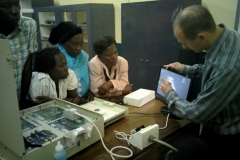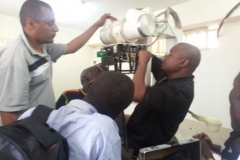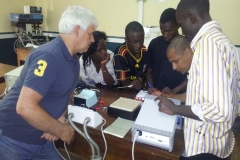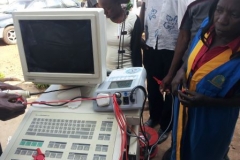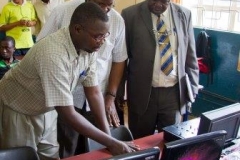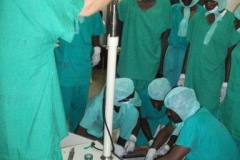Kyambogo University
- Institution: Kyambogo University
- Department: Electrical and Electronic Engineering
- Location: Kampala (Uganda)
- Website: http://www.kyu.ac.ug
- Contact person: Eng. Dr(s). Okuonzi John
Brief description
In between 2004 to 2006, the Ministry of Health (MOH) started an initiative of formation of a partnership designed to strengthen Uganda’s training capacity in the field of Biomedical Engineering. This was spearheaded and made possible by Dr. Jacinto Amandua, the Commissioner Clinical Services and Eng. Sam Wanda, the Assistant Commissioner Health Infrastructure, MOH. Other key actors from MOH included Eng. John Twesigye and Eng. Sitra Mulepo from MOH. This partnership was supported by the Government of Uganda and Netherlands under the ORET project.
It was the first supported partnership in Uganda to focus on biomedical engineering and technology as an important component of health systems strengthening. Uganda faced a critical shortage of trained biomedical engineers and technicians capable of properly maintaining and repairing diagnostic and treatment equipment at healthcare facilities throughout the country.
Kyambogo University was identified to establish Uganda’s first Biomedical Engineering Diploma programme in 2006, at the Department of Electrical and Electronic Engineering, Faculty of Engineering. This was based on Kyambogo University’s reputation of producing hands-on graduates.
A Memorandum of Understanding (MOU) was signed between Kyambogo University (KYU) and MOH on 16th August, 2008. The MOU was signed by the Deputy University Secretary, Mr. Patrick Madaya on behalf of Kyambogo University and the Permanent Secretary in the Ministry of Health, Dr. Mary Nannono, on behalf of MOH. Together, with the partners, the University has worked to strengthen Biomedical engineering Capacity in Uganda. This is largely through the curricula and staff development and the improvement of practical training opportunities at the university. Using the University Moto of “Knowledge and Skills for Services”, during the implementation, the students and staff teaching the programme offered outreach support service. This included repair and maintenance services on medical equipment during hospital training study visits at some private and public hospitals. Since its launch in 2010, 61 students have graduated with Diplomas in Biomedical Engineering and almost all the graduates are employed in both the public and private health sector.
The university has completed the development of a curriculum for hybrid Bachelors programme, Mectranics with Biomedical Studies. The strategy is to make the students not only relavent in biomedical engineering but in industry.
Training Activities
- The students have been trained effectively and prepared curriculum fully covered
- The training material received under the project are effectively utilized to give hands on training to the students.
- Students are helped the to gain valuable skills in repair, maintenance and servicing of equipment
- There is Moodle e-Learning platform to provide learning materials
- The training is blended with practical training in Hospital environments, as results the students were able to fix some valuable equipment in three different national referral Hospitals. This included Mbarara hospital (Ultrasound machine & X-ray Machine, Mulago hospital (Patient Monitoring equipment) and Jinja Hospital (Mortuary Refrigerators) etc
